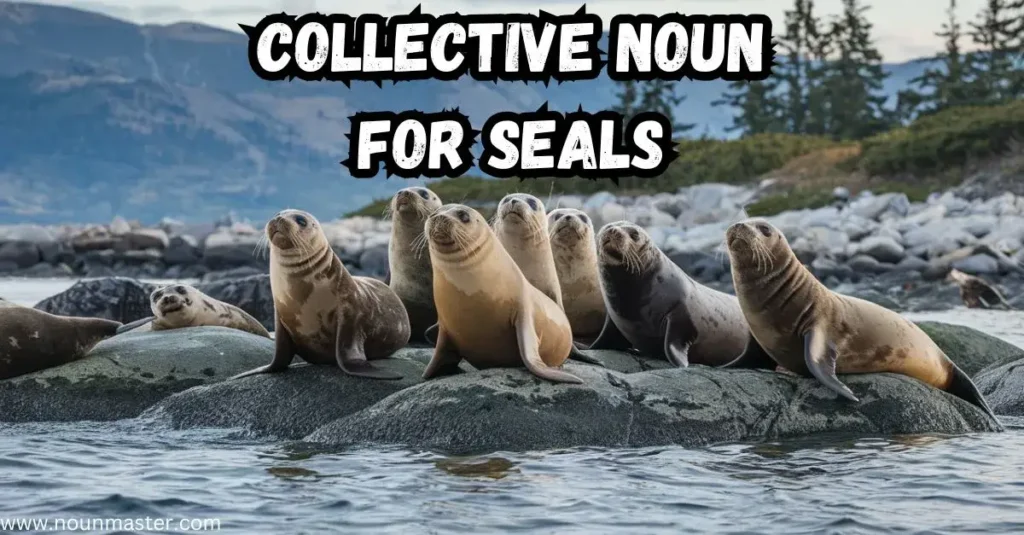Hi, young explorers! Today, we are discussing an amazing and fascinating creature: seals and their collective noun. Seals are delightful animals found in oceans and seas around the world. Known for their playful nature, they are a joy to watch.
Did you know the collective noun for seals is often called a “pod” or “colony”? When seals gather, they are called a ‘pod.’ This term highlights how they come together for warmth and comfort. Learning about this collective noun helps us appreciate their social behavior and interactions in the wild.
Table of Collective Noun for Seals
Seals are fascinating marine animals that live and travel in groups. These groups have different names depending on their activities and environment. Below is a table of collective nouns for seals, each with a simple definition and example to help you understand how these terms are used.
| Collective Noun | Definition | Example |
| Harem | A group of female seals gathered around a single male during the breeding season | We saw a harem of seals resting on the beach. |
| Colony | A group of seals that live and socialize together on land or in water | A colony of seals basked in the sun on the beach. |
| Bob | A group of seals resting or moving together, often in the water | A bob of seals rested on a rock by the ocean. |
| Pod | A group of seals that swim and rest together in the ocean | A pod of seals played together in the ocean waves. |
| Herd | A group of seals that gather together, often on beaches or ice | A herd of seals swam together near the shore. |
What Is A Group of Seals Called?
A group of seals has different names based on what they’re doing and where they are. Some common names are colony, pod, harem, bob, and herd. Each name shows a special way seals gather together in nature.
Detailed Explanations with Examples For Seals
Seals often gather in groups, and each group has its own name. Different terms describe how and where seals gather, like colony, pod, or harem. Here, you’ll find simple explanations and examples to understand each term.
Group of Cobras: What is the Proper Collective Noun?
Harem of Seals
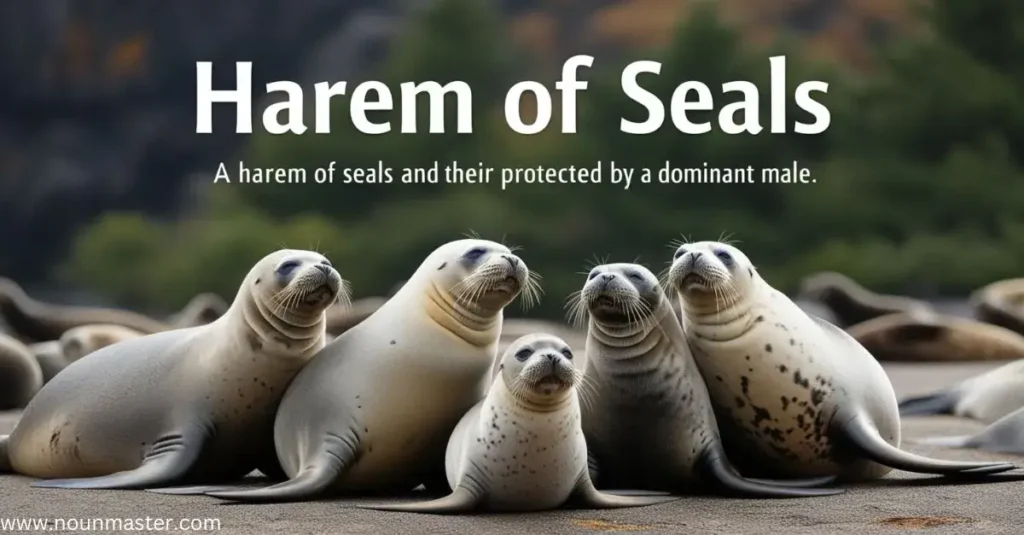
A harem of seals refers to a group of female seals and their young that are protected by a dominant male. This term is often used when seals gather during mating season.
Examples:
- The researchers observed a harem of seals from a nearby boat.
- A harem of seals gathered around the large male.
- The dominant male watched over his harem of seals.
- A harem of seals played in the shallow water near the shore.
- A harem of seals can often be found during mating season.
Colony of Seals
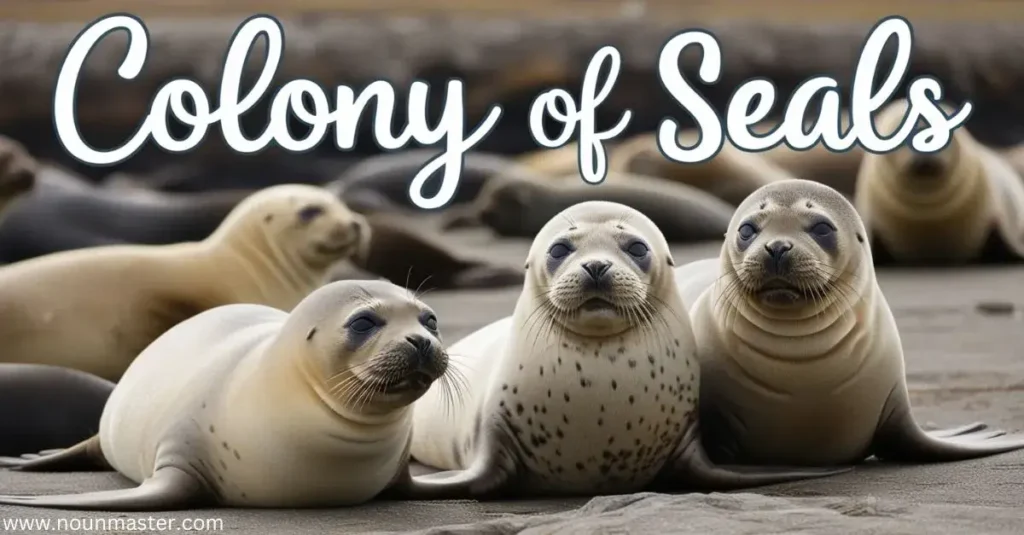
A colony of seals refers to a group of seals living and moving together, usually found on land or ice where they rest, breed, and socialize. Seals often gather in colonies for protection and warmth.
Examples:
- A colony of seals dived into the ocean together.
- The researchers studied the behavior of a colony of seals.
- A colony of seals made loud barking sounds as they played.
- Tourists watched a colony of seals from the boat.
- Photographers captured beautiful images of a colony of seals on the beach.
Bob of Seals
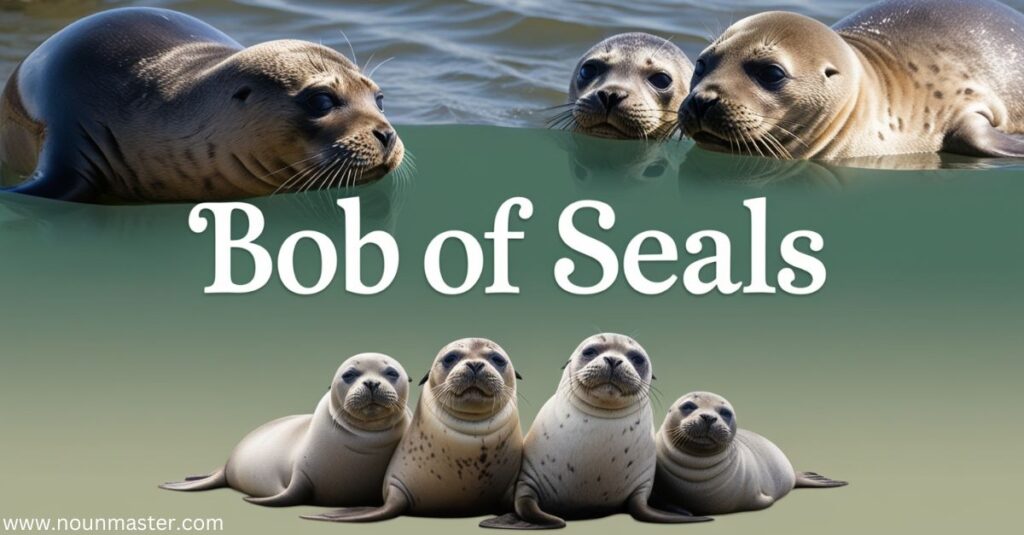
A bob of seals refers to a group of seals, often seen swimming together in the water. The word “bob” highlights how seals often float or bob up and down in the water while resting or playing.
Examples:
- The children enjoyed watching a bob of seals playing near the pier.
- We saw a bob of seals floating near the shore.
- A bob of seals swam playfully in the waves.
- The boat passed by a bob of seals basking in the sun.
- A bob of seals can often be seen near rocky shorelines.
Pod of Seals
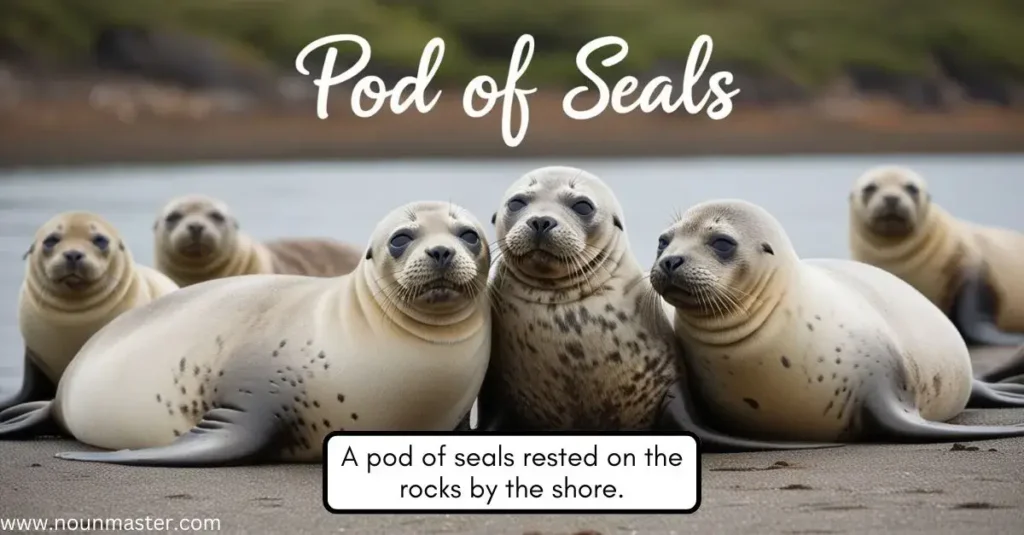
A pod of seals refers to a group of seals that are swimming or resting together. Seals are social animals, and they often gather in groups called “pods” while in the water or on land.
Examples:
- A pod of seals moved together to a new spot on the beach.
- A pod of seals rested on the rocks by the shore.
- We saw a pod of seals swimming near the boat.
- The tourists watched a pod of seals basking in the sun.
- A pod of seals surfaced near the pier, looking curious.
Herd of Seals
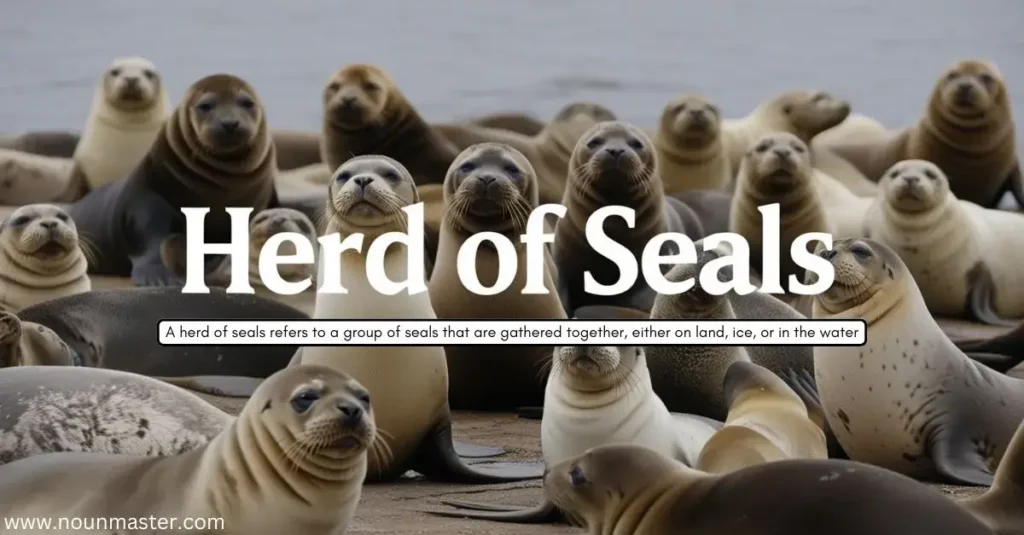
A herd of seals refers to a group of seals that are gathered together, either on land, ice, or in the water. Seals often form groups for resting, swimming, or hunting.
Examples:
- We watched a herd of seals playing in the waves.
- We saw a herd of seals resting on the beach.
- A herd of seals dived into the water to catch fish.
- The photographer captured stunning shots of a herd of seals on the shore.
- The boat passed by a herd of seals lounging on a sandbar.
Final Thoughts
At the end, a group of seals is called a “pod.” This term reflects their social nature and how they often come together to rest, play, and communicate with each other. Understanding this collective noun helps us appreciate the unique behaviors of seals.
Seals are not just cute animals; they are also intelligent and social creatures that thrive in their ocean environments. Understanding the concept of a “pod” deepens our appreciation for seals and highlights the beauty of nature’s connections among different species.
What is a Group of Raccoons Called?
Seals Collective Noun Quiz 🦭
Seals, those charming marine mammals that capture our hearts with their playful nature and soulful eyes, have several interesting collective nouns. Whether they’re lounging on beaches, swimming in the ocean, or gathered on ice floes, these social creatures have unique terms that describe their various groupings.
Let’s dive into the fascinating world of seal collective nouns!
Quiz Questions
What is the most common collective noun for a group of seals on land?
- a) Colony
- b) Pod
- c) Herd
- d) Gang
Which term describes a group of seals in water?
- a) School
- b) Pod
- c) Shoal
- d) Fleet
What collective noun for seals emphasizes their resting behavior?
- a) Slumber
- b) Snooze
- c) Bob
- d) Nap
Which term specifically describes a breeding group of seals?
- a) Rookery
- b) Nursery
- c) Colony
- d) Gathering
What playful term describes seals floating together?
- a) Bob
- b) Float
- c) Drift
- d) Wave
Correct Answers With Short Explanation
- Colony: The primary term for seals gathered on land is colony.
- Pod: A pod of seals refers to a group swimming together in water.
- Bob: A bob of seals describes their relaxed floating behavior.
- Rookery: A rookery specifically refers to a breeding colony of seals.
- Bob: A bob of seals describes their gentle up-and-down motion while floating.
Fascinating Seal Facts 🦭
- Social Structure: Seals form different types of groups depending on season and activity.
- Breeding Colonies: Large gatherings occur during breeding season, forming impressive rookeries.
- Communication Methods: Seals use various vocalizations and body language to communicate.
- Protection Strategy: Groups provide safety from predators and help in finding food.
- Habitat Adaptation: Seals group differently based on species and habitat type.
- Swimming Patterns: Pods of seals often coordinate their movements while hunting.
- Resting Behavior: Seals gather in close groups while resting for warmth and protection.
- Seasonal Changes: Group sizes and compositions change throughout the year.
- Territory: Male seals often establish and defend territories during breeding season.
- Conservation Needs: Many seal species require group protection for survival.

